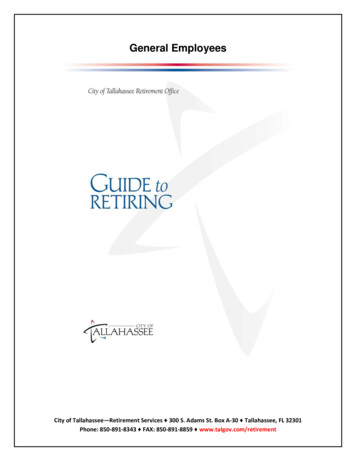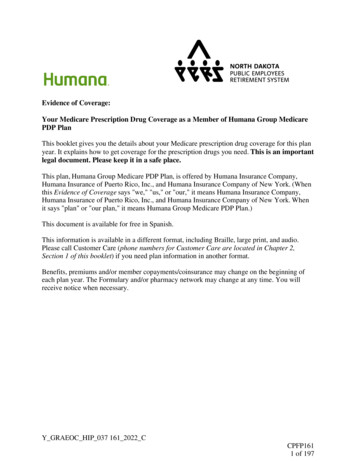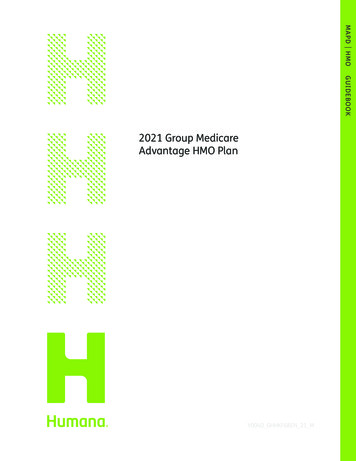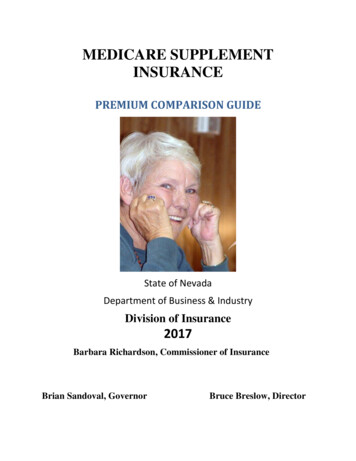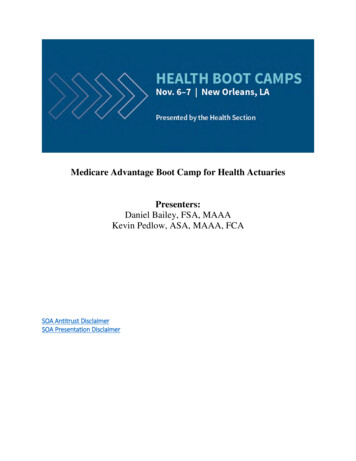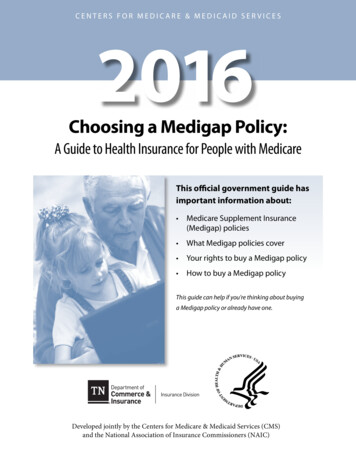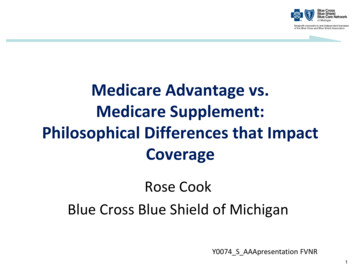
Transcription
Print-Friendly VersionMedicare Parts A & B Appeals ProcessPage 1 of 17MLN006562 May 2021
Medicare Parts A & B Appeals ProcessMLN BookletTable of ContentsWhat’s Changed? . 3Introduction. 4Appealing Medicare Decisions. 4Appointing a Representative . 6Transfer Appeal Rights to Non-participating Providers & Suppliers . 6First Appeal Level: MAC Redetermination . 7Second Appeal Level: Qualified Independent Contractor (QIC) Reconsideration . 9Third Appeal Level: Office of Medicare Hearings and Appeals (OMHA) Disposition.11Fourth Appeal Level: Medicare Appeals Council (Council) Review . 13Fifth Appeal Level: U.S. District Court Judicial Review . 15Appeal Tips . 15Appeal Process Summary . 16Resources . 17Page 2 of 17MLN006562 May 2021
Medicare Parts A & B Appeals ProcessWhat’s Changed?Note: No substantive content updates.Page 3 of 17MLN006562 May 2021MLN Booklet
Medicare Parts A & B Appeals ProcessMLN BookletIntroductionThis booklet tells health care providers about Medicare’s 5 appeal levels in Fee-for-Service (FFS)(original Medicare) Parts A & B and includes resources on related topics. This booklet doesn’t coverMedicare Parts C or D appeals. It describes how providers, physicians, and suppliers apply theappeals process to their services.Find more information on the CMS Appeals and Medicare Appeals webpages.Appealing Medicare DecisionsMedicare FFS has 5 appeal process levels:Level 1 - MAC RedeterminationLevel 2 - Qualified Independent Contractor (QIC) ReconsiderationLevel 3 - Office of Medicare Hearings and Appeals (OMHA) DispositionLevel 4 - Medicare Appeals Council (Council) ReviewLevel 5 - U.S. District Court Judicial ReviewMake all appeal requests in writing.CMS Removes Signature RequirementsIn a 2019 Final Rule, CMS ended the requirement that appellants sign their appeal requests.Page 4 of 17MLN006562 May 2021
Medicare Parts A & B Appeals ProcessMLN BookletIn this booklet, “I” or “you” refers to patients, parties, and appellants active in an appeal.Helpful TermsAmount in Controversy (AIC): The required threshold Level 3 and Level 5 appeal dollaramount remaining in dispute. CMS adjusts the AIC annually by a percentage increase tied to aconsumer price index.Appeal: The process used when a party (for example, a patient, provider, or supplier)disagrees with an initial health care items or services determination or a revised determination.Appellant: A person or entity filing an appeal.Attorney Adjudicator: A licensed attorney HHS OMHA employs with knowledge of Medicarecoverage and payment laws and guidance, authorized to issue QIC dismissal review decisionsand certain Administrative Law Judge (ALJ) hearing requests.Determination: A decision on payment and claim liability.Escalation: When an appellant requests moving a reconsideration pending at the QIClevel (second level appeal) or higher to the next level because the adjudicator can’t make aprompt decision or dismissal. The appeal must meet the applicable AIC Level 3 and Level 5requirements and aggregation provisions.Medicare Redetermination Notice (MRN): A Medicare Administrative Contractor (MAC) letterinforming a party about the redetermination decision.Non-participating: Physicians and suppliers who haven’t signed a Medicare participationagreement but may choose to accept or not accept Medicare assignment on a claim-by-claimbasis. Non-participating physicians and suppliers have limited appeal rights.On-the-Record: A decision based solely on information within the administrative record andevidence sent with the request. There’s no hearing held.Party: A person or entity with standing to appeal an initial determination or subsequentadministrative appeal determination or decision.Page 5 of 17MLN006562 May 2021
Medicare Parts A & B Appeals ProcessMLN BookletAppointing a RepresentativeA party may appoint an individual, including an attorney, at any time to represent them during theclaim or appeal process.To appoint a representative, the party and representative must complete theAppointment of Representative Form (CMS-1696) or another written document that must: Be signed and dated by the party and representative Include a statement appointing the representative to act for the party If the party is the patient, include a statement authorizing the adjudicator to release identifiablehealth information to the appointed representative Include a written explanation of the representative’s purpose and scope Include the party and representative names, phone numbers, and addresses Include the representative’s professional status or relationship to the party Include the represented party’s unique identifier If the party is the patient, include their Medicare Beneficiary Identifier (MBI) If the party is a provider or supplier, include their National Provider Identifier (NPI) Be filed with the entity processing the party’s initial determination or appealNOTE: Providers and suppliers representing a patient can’t charge them a fee and must agree towaive the right to collect payment for items or services described in SSA Section 1879(a)(2).The appointment is valid for 1 year from the dateAppointing Representativesthe party and appointed representative sign thedocument and remains valid for the entire appealGet the requirements for appointing aduration for which it was filed, unless revoked.representative at 42 CFR Section 405.910.You can use the appointment for multiple claimsor appeals during that year unless the partyspecifically withdraws the representative’s authority. Once an appointment is filed with an appealrequest, the appointment is valid beyond 1 year throughout all administrative appeals process levelsfor that appeal, unless the party revokes it.Transfer Appeal Rights to Non-participatingProviders & SuppliersPatients may transfer their appeal rights to non-participating providers or suppliers who providethe items or services and don’t otherwise have appeal rights. To transfer appeal rights, thepatient and non-participating provider or supplier must complete and sign theTransfer of Appeal Rights Form (CMS-20031).Page 6 of 17MLN006562 May 2021
Medicare Parts A & B Appeals ProcessMLN BookletFirst Appeal Level: MAC RedeterminationA redetermination is the first appeal level after the initial claim determination.Table 1. Redetermination FAQs & AnswersQuestionAnswerYou must request a redetermination within 120 days from the date you gotthe Electronic Remittance Advice (ERA) or Standard Paper Remittance (SPR)Advice that lists the initial determination. The receipt date is presumed to be 5days after the notice date, unless there’s evidence the determination, decision,or notice wasn’t received within that time.File your request in writing by following instructions in the ERA or SPR. Usethe Medicare Redetermination Request Form (CMS-20027), or any writtendocument that has the required appeal elements as stated on the ERA or SPR.Send your request to the address on the ERA or SPR. For instructions on howto send your request electronically, contact your MAC.When must I filea request?How do I filea request?Get more information about redeterminations and what’s required for a requeston the First Level of Appeal: Redetermination by a Medicare Contractorwebpage.Remember You or your representative must include all required information Attach any supporting documents Keep a copy of all appeal documents you send to MedicareNo.Is there aminimum AICrequirement?Who decides?How long does ittake to decide?MAC staff uninvolved with the initial claim determination perform theredetermination.MACs generally issue a decision within 60 days of the redetermination requestreceipt date.Your MAC tells you its decision via a Medicare Redetermination Notice (MRN),or if they reverse the initial decision and pay the claim in full, you get a revisedERA or SPR.Page 7 of 17MLN006562 May 2021
Medicare Parts A & B Appeals ProcessMLN BookletTable 1. Redetermination FAQs & Answers (cont.)QuestionCan a MACdismiss aredeterminationrequest?AnswerA MAC may dismiss a redetermination request: If the party (or appointed representative) requests appeal withdrawal If there’s certain defects, such as: Party didn’t file request within appropriate time frame and didn’t show (orthe MAC didn’t decide) good cause for late filing There’s no initial determination Requestor isn’t a proper partyFind MAC dismissal information in Medicare Claims Processing Manual,Chapter 29.Parties to MAC dismissals have 2 choices to dispute: Request QIC review dismissal within 60 days of dismissal notice receipt(second appeal level) Request MAC vacate dismissal within 180 days of dismissal notice receipt The receipt date is presumed to be 5 days after the notice date, unlessthere’s evidence the determination, decision, or notice wasn’t receivedwithin that timeNOTE: MLN Matters Article SE17010 explains the Durable Medical Equipment (DME) suppliersprocess improvements for filing Medicare FFS recurring (or serial) capped claims rental itemsand certain Inexpensive and Routinely Purchased (IRP) items. These improvements helpcorrect claim errors without initiating the appeals process for all claims in a series.Page 8 of 17MLN006562 May 2021
Medicare Parts A & B Appeals ProcessMLN BookletSecond Appeal Level:Qualified Independent Contractor (QIC) ReconsiderationIf you disagree with the MAC redetermination decision, you may request a QIC reconsideration.A reconsideration is a redetermination decision review.Table 2. Reconsideration FAQs & AnswersQuestionWhen must I filea request?How do I filea request?AnswerYou must file a reconsideration request within 180 days of the MRN receiptdate. Make QIC review requests of a MAC dismissal within 60 days of thedismissal notice receipt. The receipt date is presumed to be 5 days after thenotice date, unless there’s evidence the determination, decision, or noticewasn’t received within that time.File your request in writing using the MRN instructions. Use theMedicare Reconsideration Request Form (CMS-20033), or any writtendocument that has the MRN-required elements.Get more information about reconsiderations and what’s required for a requeston the Second Level of Appeal: Reconsideration by a QIC webpage.Remember Clearly explain why you disagree with redetermination decision You or your representative must include all required information Send: Copy of the Remittance Advice (RA) or MRN Patient’s MBI Include any missing evidence listed on redetermination notice and otherrelevant evidence or documents Name of MAC that issued redeterminationIf you send documents after you file the reconsideration request, it may extendthe QIC’s decision time frame.Is there aminimum AICrequirement?Page 9 of 17Make sure you send all evidence you want considered with your reconsiderationrequest. Evidence first submitted at later appeal levels won’t be consideredunless you show good cause.No.MLN006562 May 2021
Medicare Parts A & B Appeals ProcessMLN BookletTable 2. Reconsideration FAQs & Answers (cont.)QuestionAnswerWho decides?How long does ittake to decide?The QIC conducts the reconsideration and independently reviews theadministrative record, including the redetermination. A panel of physicians orother health care professionals may review medical necessity issues as part ofthe reconsideration.A QIC generally sends a decision to all parties within 60 days of thereconsideration request receipt date. If the QIC can’t complete its decision inthe applicable time frame, it informs you of your rights and the procedures toescalate the case to OMHA.If you don’t get a reconsideration decision within 60 days, consider allowing anextra 5–10 days for mail delays before escalating your appeal to OMHA. Findinformation on escalating your appeal to OMHA on the Third Level of Appeal:Decision by Office of Medicare Hearings and Appeals webpage.Can a QICdismiss areconsiderationrequest?A QIC may dismiss a reconsideration request: If the party (or appointed representative) requests appeal withdrawal If there’s certain defects, such as: Party didn’t file request within appropriate time frame and didn’t show (orthe QIC didn’t decide) good cause for late filing There’s no redetermination Requestor isn’t a proper partyFind QIC dismissal information at 42 CFR Section 405.972.Parties to QIC dismissals have 2 choices to dispute: Request OMHA Administrative Law Judge (ALJ) or attorney adjudicatorydismissal review within 60 days of dismissal notice receipt Request QIC vacate dismissal within 180 days of dismissal notice receiptNOTE: The Formal Telephone Discussion Demonstration allows selected DME suppliers and certainPart A providers who filed a reconsideration request the opportunity to participate in aformal recorded phone discussion with the DME QIC and the Part A East QIC, respectively.Demonstration activities are scheduled to continue through December 31, 2021. Find moreinformation on the Appeals Demonstration Part A East Appeals Demonstration andDME Appeals Demonstration webpages.Page 10 of 17MLN006562 May 2021
Medicare Parts A & B Appeals ProcessMLN BookletThird Appeal Level:Office of Medicare Hearings and Appeals (OMHA) DispositionIf you disagree with the reconsideration decision or want to escalate your appeal because thereconsideration decision time frame passed, you can request an ALJ hearing.This appeal level allows you—via phone, video-teleconference (VTC), or occasionally in person—toexplain your position to an ALJ. If you don’t want to attend a hearing, you can ask an OMHA ALJor attorney adjudicator to make a decision based on evidence and the “administrative record of theappeal” (known as an on-the-record decision). The HHS OMHA is the third Medicare claims appeallevel and is functionally and organizationally independent of CMS.Table 3. OMHA Review FAQs & AnswersQuestionAnswerWhen must I You must file an ALJ hearing request or a hearing waiver within 60 days of thefile a request? reconsideration decision letter receipt date. If requesting escalation to OMHA, file arequest with the QIC for OMHA review after the reconsideration period expires. Thereceipt date is presumed to be 5 days after the notice date, unless there’s evidencethe determination, decision, or notice wasn’t received within that time.Follow the reconsideration letter instructions to file your request in writing. You mayHow do I filealso complete the Request for ALJ Hearing or Review of Dismissal Form (OMHA-100)a request?and Multiple Claim Attachment Form (OMHA-100A), as applicable.If you don’t want a phone hearing, you may ask for an in-person or VTC hearing,but you must demonstrate good cause.If you prefer to waive a hearing, select that choice in Form OMHA-100, Section 9.If you already sent your OMHA-100 form, complete a Waiver of Right to an ALJHearing Form (OMHA-104) and ask for an on-the-record review. If OMHA grantsan on-the-record review, an OMHA adjudicator issues a disposition based oninformation in the administrative record and any evidence sent with the request,subject to new evidence standards of 42 CFR Section 405.1028.Find more information about requesting an ALJ hearing, requirements, and includingadditional needed forms, on the Office of Medicare Hearings and Appeals and ThirdLevel of Appeal: Decision by Office of Medicare Hearings and Appeals webpages.Remember You must send a copy of the ALJ hearing request to all other QIC reconsiderationparties. If you request Council escalation, send a copy to all other parties and theassigned adjudicator or OMHA Central Operations (if the adjudicator isn’t assigned). The ALJ sets hearing procedures. CMS or its contractors may become a partyto, or participate in, an ALJ hearing after providing notice to the ALJ and theinvolved parties.Page 11 of 17MLN006562 May 2021
Medicare Parts A & B Appeals ProcessMLN BookletTable 3. OMHA Review FAQs & Answers (cont.)QuestionIs there aminimum AICrequirement?AnswerYes. You may request an ALJ hearing only if a certain dollar amount stays incontroversy following the QIC’s decision. CMS annually updates and publishes theAIC Threshold.Learn about the AIC-calculated amount on the OMHA FAQs webpage.Get more information on aggregating claims to meet the AIC and aggregatingclaims escalated from the QIC level for an ALJ hearing at42 CFR Section 405.1006(e)(1)–(F)(2).Who decides? The ALJ or attorney adjudicator decides and issues a disposition.If an ALJ or attorney adjudicator fails to issue a disposition within the applicabletime frame, you may choose to escalate the appeal to the Council. Otherwise, theappeal remains pending with OMHA.Once the ALJ or attorney adjudicator completes action on a case, OMHA sends thedecision and case file to the “Administrative QIC (AdQIC)” (the central manager forall Medicare FFS claim case files appealed to QIC or beyond). In certain situations,the AdQIC may refer the case to the Council on CMS’s behalf.If no referral is made to the Council and the ALJ or attorney adjudicator dispositionoverturns a previous denial (in whole or in part), the AdQIC tells the MAC it mustpay the claim, in accordance with the OMHA disposition, within 30–60 days.For Parts A and B appeals, OMHA has a 90-day time frame to complete itsHow longdoes it take to review and issue a disposition. Although the large volume of appeal requestspreviously caused delays in processing, OMHA is on track to return to a 90-daydecide?adjudication period.OMHA stays committed to processing ALJ hearing requests in the order they getthem and as quickly as possible, given pending requests and adjudicatory resources.OMHA prioritizes expedited Part D prescription drug denial cases and Medicarepatient issues.If OMHA doesn’t issue a disposition within the applicable time frame, you may askOMHA to escalate the case to the Council. Find more information on escalating tothe Council on the Escalation Rights webpage.OMHA processes new appeal requests as quickly as possible. You’ll get anAcknowledgement of Request letter after they enter your case in the OMHA casetracking system. Find more information on the Office of Medicare Hearings andAppeals and ALJ Appeal Status Information System (AASIS) webpages.To help reduce the number of ALJ outstanding requests, OMHA began theSettlement Conference Facilitation (SCF) (an alternative dispute resolution processthat uses mediation principles) and Statistical Sampling Initiative (applies toappellants with a large volume of claim disputes).Page 12 of 17MLN006562 May 2021
Medicare Parts A & B Appeals ProcessMLN BookletTable 3. OMHA Review FAQs & Answers (cont.)QuestionCan OMHAdismissa reviewrequest?AnswerOMHA may dismiss a request for ALJ hearing or QIC review: If the party (or appointed representative) requests appeal withdrawal. For cause authorized under the regulations. Find more information on dismissalsat 42 CFR Section 405.1052.OMHA mails or sends a written dismissal notice to all parties who got a copy of thehearing or review request.Parties to the OMHA dismissal may request the adjudicator vacate the dismissal,and request Medicare Appeals Council (the Council) review within 60 days of thedismissal notice receipt.Fourth Appeal Level:Medicare Appeals Council (Council) ReviewIf you disagree with the ALJ or attorney adjudicator decision, or you wish to escalate your appealbecause the OMHA adjudication time frame passed, you may request a Council review. The Councilis part of the HHS Departmental Appeals Board (DAB).Table 4. Council Review FAQs & AnswersQuestionWhen must I filea request?How do I file arequest?AnswerYou must file a Council review request within 60 days of the OMHA decisionor dismissal receipt date. The receipt date is presumed to be 5 days after thenotice date, unless there’s evidence the determination, decision, or noticewasn’t received within that time.File your request in writing by following instructions included in the OMHAdisposition package or completing a Request for Review of ALJ MedicareDecision/Dismissal Form (DAB-101). File your request electronically throughthe DAB E-File webpage.Find more information about requesting a Council review and requirementsfollowing an OMHA decision on the Medicare Appeals Council and Fourth Levelof Appeal: Review by the Medicare Appeals Council webpages.Remember Explain which part of the OMHA decision you disagree with and why You must send all parties in OMHA’s disposition a copy of the Councilreview requestPage 13 of 17MLN006562 May 2021
Medicare Parts A & B Appeals ProcessMLN BookletTable 4. Council Review FAQs & Answers (cont.)QuestionAnswerNo.Is there aminimum AICrequirement?Who decides?The Council. The Council may adopt, modify, reverse, or remand the ALJ’s orattorney adjudicator’s disposition. The Council may also deny or dismiss thereview request or dismiss the ALJ hearing request.The Council sends the decision and case file to the AdQIC, the central managerfor all Council FFS Medicare claim case files.How long does ittake to decide?If the Council decision overturns an earlier denial (in whole or in part), theAdQIC tells the MAC it must pay the claim according to the Council’s decisionwithin 30–60 days.The Council generally decides within 90 days of the OMHA disposition ordismissal review request receipt date. If the Council review comes from anescalated appeal, the Council has 180 days from the escalation request receiptdate to issue a decision. A decision may take longer for many reasons.If the Council issues no decision within the applicable time frame, you may askthe Council to escalate the case to the U.S. District Court.If you request U.S. District Court escalation, you must send a copy of therequest to all other parties and the Council.Can the CouncilThe Council may dismiss or deny a review request:dismiss or deny a If appeal request isn’t on timereview request? At the party’s request Party doesn’t have a right to request Council reviewThe Council mails or sends a written notice to all parties copied on the ALJ orattorney adjudicator’s Notice of Decision. Dismissal of a request for Councilreview, or denial of a request for review of a dismissal issued by OMHA, isbinding and not subject to further review, unless the Council reopens it and it’svacated by them. The Council’s hearing request dismissal is also binding andnot subject to judicial review.Page 14 of 17MLN006562 May 2021
Medicare Parts A & B Appeals ProcessMLN BookletFifth Appeal Level: U.S. District Court Judicial ReviewIf you disagree with the Council decision, or you wish to escalate your appeal because the Councildecision time frame passed, you may request judicial review.Table 5. U.S. District Court Judicial Review FAQs & AnswersQuestionAnswerYou must file a judicial review request within 60 days of the Council decisionreceipt or after the Council decision time frame expires.The Council’s decision (or notice of escalation right) informs you how to file aclaim in U.S. District Court.When must I filea request?How do I filea request?Find more information about requesting a Judicial Review on theFifth Level of Appeal: Judicial Review in Federal District Court webpage.Is there aminimum AICrequirement?Yes. You may request judicial review only if a certain dollar amount staysin controversy following the Council decision. CMS annually updates andpublishes the AIC Threshold.Who decides?The U.S. District Court.Appeal TipsBest filing appeals practices: Make all appeal requests in writing. Starting at Level 2 or 3, consolidate all similar claims into 1 appeal. File requests on time with the appropriate entity. Include a copy of the decision letter(s) or claim information issued at prior level(s). Include a copy of the demand letter(s) if appealing an overpayment determination. If the appeal involves an overpayment determined through sampling and extrapolation, identify allcontested sample claims in 1 appeal request and clearly state any sampling methodology challenges. Include all relevant supporting documents with your first appeal request. Include a copy of the Appointment of Representative form if the requestor isn’t a party and isrepresenting the appellant. Respond promptly to document requests.Find more information about the Medicare overpayment collection process in theMedicare Overpayments fact sheet.Page 15 of 17MLN006562 May 2021
Medicare Parts A & B Appeals ProcessMLN BookletAppeal Process SummaryTable 6. Appeal Process SummaryReviewProcessSummaryLevelFirst Level –Document initialMAC Redetermination claim reviewdeterminationWhodecides?MACWhen must I filea request?How long does ittake to decide?Up to 120 days after youget initial determination60 daysAICNoFormsCMS-20027CMS-20031Second Level –Qualified IndependentContractor (QIC)ReconsiderationDocumentredeterminationreview; send anymissing appealevidenceQICUp to 180 days after you getthe Medicare RedeterminationNotice (MRN)60 daysNoCMS-20033Third Level – Officeof Medicare Hearingsand Appeals (OMHA)DispositionMay be aninteractive hearingbetween parties oran on-the-recordreviewAdministrativeLaw Judge (ALJ)or attorneyadjudicatorUp to 60 days after you getthe QIC decision notice or afterQIC reconsideration expirationtime frame if you don’t geta decision90 days if appealing a QICreconsideration decision ordismissalYesOMHA-100Fourth Level –Medicare AppealsCouncil (Council)ReviewDocument ALJ’sreview decision(you may requestoral arguments)CouncilUp to 60 days after you get theOMHA’s disposition notice orafter expiration time frameif you don’t get a decision90 days if appealing an OMHAdisposition or dismissalFifth Level –U.S. District CourtJudicial ReviewJudicial reviewU.S. DistrictCourtUp to 60 days after you get theCouncil decision notice or afterCouncil expiration time frameif you don’t get a decisionNo statutory time limitPage 16 of 17MLN006562 May 2021OMHA-100AOMHA-104or180 days if appeal wasescalated to OMHANoDAB-101YesNo HHS formavailableor180 days if ALJ review timeexpired without an ALJ decision
Medicare Parts A & B Appeals ProcessMLN BookletResources 42 CFR Part 405, Subpart I Medicare Claims Processing Manual, Chapter 29 Medicare Appeals Process Original Medicare Appeals Original Medicare (Parts A & B) Appeals Flowchart SSA Section 1869 U.S. Federal CourtsMedicare Learning Network Content Disclaimer, Product Disclaimer, and Department of Health & Human Services DisclosureThe Medicare Learning Network , MLN Connects , and MLN Matters are registered trademarks of the U.S. Departmentof Health & Human Services (HHS).Page 17 of 17MLN006562 May 2021
This booklet tells health care providers about Medicare's 5 appeal levels in Fee-for-Service (FFS) (original Medicare) Parts A & B and includes resources on related topics. This booklet doesn't cover Medicare Parts C or D appeals. It describes how providers, physicians, and suppliers apply the appeals process to their services.
